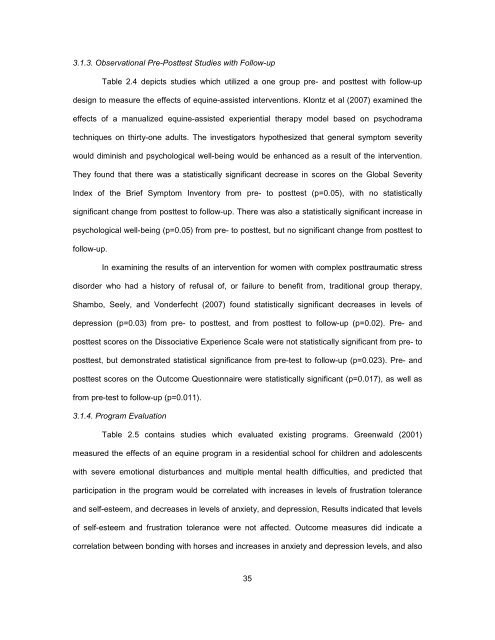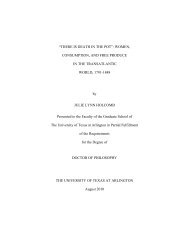A SYSTEMATIC REVIEW OF THE EFFECTS OF PSYCHOTHERAPY ...
A SYSTEMATIC REVIEW OF THE EFFECTS OF PSYCHOTHERAPY ...
A SYSTEMATIC REVIEW OF THE EFFECTS OF PSYCHOTHERAPY ...
Create successful ePaper yourself
Turn your PDF publications into a flip-book with our unique Google optimized e-Paper software.
3.1.3. Observational Pre-Posttest Studies with Follow-up<br />
Table 2.4 depicts studies which utilized a one group pre- and posttest with follow-up<br />
design to measure the effects of equine-assisted interventions. Klontz et al (2007) examined the<br />
effects of a manualized equine-assisted experiential therapy model based on psychodrama<br />
techniques on thirty-one adults. The investigators hypothesized that general symptom severity<br />
would diminish and psychological well-being would be enhanced as a result of the intervention.<br />
They found that there was a statistically significant decrease in scores on the Global Severity<br />
Index of the Brief Symptom Inventory from pre- to posttest (p=0.05), with no statistically<br />
significant change from posttest to follow-up. There was also a statistically significant increase in<br />
psychological well-being (p=0.05) from pre- to posttest, but no significant change from posttest to<br />
follow-up.<br />
In examining the results of an intervention for women with complex posttraumatic stress<br />
disorder who had a history of refusal of, or failure to benefit from, traditional group therapy,<br />
Shambo, Seely, and Vonderfecht (2007) found statistically significant decreases in levels of<br />
depression (p=0.03) from pre- to posttest, and from posttest to follow-up (p=0.02). Pre- and<br />
posttest scores on the Dissociative Experience Scale were not statistically significant from pre- to<br />
posttest, but demonstrated statistical significance from pre-test to follow-up (p=0.023). Pre- and<br />
posttest scores on the Outcome Questionnaire were statistically significant (p=0.017), as well as<br />
from pre-test to follow-up (p=0.011).<br />
3.1.4. Program Evaluation<br />
Table 2.5 contains studies which evaluated existing programs. Greenwald (2001)<br />
measured the effects of an equine program in a residential school for children and adolescents<br />
with severe emotional disturbances and multiple mental health difficulties, and predicted that<br />
participation in the program would be correlated with increases in levels of frustration tolerance<br />
and self-esteem, and decreases in levels of anxiety, and depression, Results indicated that levels<br />
of self-esteem and frustration tolerance were not affected. Outcome measures did indicate a<br />
correlation between bonding with horses and increases in anxiety and depression levels, and also<br />
35
















